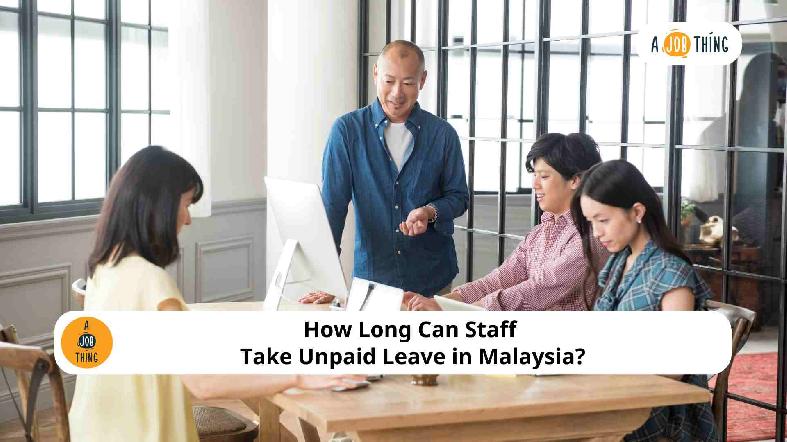
How Long Can Staff Take Unpaid Leave in Malaysia?
Are You Hiring?
Find candidates in 72 Hours with 5+ million talents in Maukerja Malaysia & Ricebowl using Job Ads.
Hire NowUnpaid leave is one of the most common concerns among employers in Malaysia. While employees may request time off beyond their entitled paid leave, the question remains: how long can staff actually take unpaid leave, and what should employers do about it?
This guide breaks down the essentials for Malaysian employers to manage unpaid leave fairly and in compliance with the Employment Act 1955.
What Is Unpaid Leave?
Unpaid leave is when an employee takes time off work without receiving their salary for the days they are absent. Unlike annual leave, sick leave, or maternity leave, unpaid leave is not automatically provided under the Employment Act 1955.
Instead, it depends on the company’s HR policies or management approval. This means employers have the discretion to allow or deny unpaid leave requests.
Is There a Limit to Unpaid Leave in Malaysia?
The Employment Act 1955 does not specify the maximum number of days an employee can take unpaid leave. Therefore, it comes down to the employer’s decision and the company’s internal policies.
Some companies may set clear guidelines, such as:
-
Limiting unpaid leave to a specific number of days per year.
-
Requiring employees to exhaust paid leave before applying for unpaid leave.
-
Approving unpaid leave only for special cases such as medical emergencies, further studies, or personal matters.
As an employer, having a transparent policy helps prevent confusion and disputes.
Employer’s Rights in Managing Unpaid Leave
Employers in Malaysia have the right to:
-
Approve or reject unpaid leave applications.
-
Adjust benefits if staff take extended unpaid leave (e.g., annual leave entitlement may be prorated).
-
Terminate employment if unpaid leave is excessive and impacts business operations, provided it is done fairly and in compliance with labour laws.
Why Employers Should Have a Clear Policy
Without clear rules, unpaid leave can disrupt workflow and create resentment among team members. A proper policy ensures:
-
Fair treatment across all employees.
-
Business continuity by planning ahead for absences.
-
Legal compliance with the Employment Act 1955.
Best Practices for Employers in Malaysia
-
Include unpaid leave terms in the employee handbook.
Example: A company clearly states that employees may apply for up to 15 days of unpaid leave per year for emergencies. -
Set approval procedures.
Example: Employees must submit a written request at least two weeks in advance (except in emergencies) and get approval from their direct manager. -
Balance compassion with business needs.
Example: If an employee’s parent is hospitalised, employers may approve extended unpaid leave but ensure workload is covered by redistributing tasks. -
Communicate clearly about impact on salary and benefits.
Example: Employers should explain if unpaid leave will reduce annual leave entitlement or delay salary increments. -
Consider special cases.
-
Medical emergencies: An employee requires long-term treatment.
-
Further studies: An employee takes a semester off to complete professional certification.
-
Business slowdown: During economic downturns, companies may negotiate unpaid leave with employees to avoid retrenchment.
-
Key Takeaway for Employers
How long staff can take unpaid leave in Malaysia is ultimately up to the employer. The law does not fix a limit, but employers should manage requests with a clear policy to protect both employee welfare and company productivity.
By setting guidelines, documenting approval processes, and balancing fairness with business needs, employers can handle unpaid leave effectively while staying compliant with Malaysian labour laws.
FAQs
1. Can an employer force an employee to take unpaid leave?
No. Employers cannot force staff to take unpaid leave. It must be agreed by both sides, usually with written consent.
2. Does unpaid leave affect EPF, SOCSO, and EIS contributions?
Yes. Since no salary is paid during unpaid leave, there will be no statutory contributions for that period. Once salary resumes, contributions continue as usual.
3. Can unpaid leave affect annual leave entitlement?
Yes. Some companies reduce annual leave if an employee takes long unpaid leave. This depends on company policy and should be stated clearly in the employee handbook.
Find Talent That Truly Fits Your Business
With AJobThing, you can reach thousands of active jobseekers across Maukerja, Ricebowl, and Epicareer — all from one platform.
Post your job ad now and start hiring smarter!
Read More:
- How to Prepare for a Smooth Handover in Malaysia (Free Templates)
- Getting to Know Working Hours and Overtime in Malaysia
- 9 Types of Paid Leave in Malaysia
- Can an Employer Reject MC in Malaysia?
- Staff Resignation with 24 Hours’ Notice: Is It Legal and How Should HR Respond?
- How to Renew Visit Pass (Temporary Employment) for Foreign Workers in Malaysia
- How to Renew Passport Malaysia : Guide for Employers
- How Working Days are Defined and Applied in Malaysian Workplaces
- Guide to Leave Entitlements in Malaysia under Employment Act
- Leave Management System for Malaysian Employers – Track Leave Easily (Free Template)
- Best Hiring Platforms in Malaysia: Which One Suits Your Business?
- Staff Working on Public Holiday Malaysia? Here’s What HR Needs to Do

